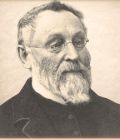COMMON NAME:
BROMINE.
Symptoms
An important remedy in laryngeal affections; also in-scrofulous and tubercular affections of the glands (N.).
Has done same wonderful work in diphtheria. The membrane first forms in the bronchi, trachea or larynx running upward (just opposite of Lycopodium, which often forms first in the nose and runs downward) (N.).
Faucial angina and very troublesome sore throat.
Complaints on the left side of the body (Lachesis).
General trembling (Argentum nitricum, Kali-Br., Phosphorus, Plb., Zincum met.).
MEMBRANOUS CROUP; GREAT RATTLING OF MUCUS (Ant-T., Nat-S., Phosphorus, Silicea, Sulphur). BUT NO EXPECTORATION. THERE SEEMS TO BE GREAT DANGER OF SUFFOCATION FROM ACCUMULATION OF MUCUS IN THE LARYNX (in bronchi-Ant-T.) (N.).
A sensation of something being alive in the skin, principally in the arms and legs.
Sensation of cobweb in the face (Borax, Graphites) (N.).
He perspires freely when exercising a little (Bryonia, China, Natrum muriaticum).
SAILORS SUFFER FROM ASTHMA “ON SEASHORE” (A.).
Fan-like motion of aloe nasi (Ant-T., Lycop. (N.).
DIZZINESS WHEN LYING DOWN, WITH HEAD ACHE, ESPECIALLY, IN THE EVENING.
DIZZINESS WHEN GOING OVER A RUNNING WATER.
Chest pains running upward (A.).
Hypertrophy of the heart from gymnastics (Arnica, Causticum, Phosphorus, Rhus toxicodendron) (N.).
Stony hard, scrofulous or tuberculous swelling of glands, especially on lower jaw and throat (thyroid, submaxillary, parotid, testes) (A.).
Croupy symptoms with hoarseness during whooping cough; gasping for breath (A.).
Membranous dysmenorrhoea, (Borax, Lac-C., Merc-C.) (N.).
Physometra: loud emission of flatus from the vagina (Lycopodium) (A.).
Tumour in breasts, with stitching pains (Conium, Phytolacca, Silicea) (Br.).
Chronic ovaritis (Apis., Lachesis, Lycopodium, Mercurius, Pulsatilla) (R.).
Menses too early and too profuse (Calcarea, China, Phosphorus) (R.).
Cannot bear pressure on the mammae; Stitching pain from the mammae to the axillae (R.).
SWELLING AND INDURATION OF THE (LEFT) TESTICLE, WITH SORE PAIN, OR SENSATION OF COLDNESS.
Great watchfulness in the evening. He had much trouble in getting to sleep at night.
Anguish in sleep, and sleep full of dreams.
Constant dreaming in sleep (Natrum carbonicum, Nux vomica, Opium, Phosphorus, Staphysagria).
Jerking and starting whilst in sleep (Belladonna, Cina, Hyos, Stramonium).
When getting awake at night trembling and sensation as if she could not rise for weakness.
Fantasy and illusions when asleep (Coffea, Opium, Phys. Piper-M.).
He cannot sleep enough in the morning.
He feels unrefreshed in the morning (Cocc., Coffea, Nux vomica).
Colic, as if the abdomen would burst (Argentum nitricum, Chamomilla, Lycopodium) (G.).
Diarrhoea, after taking oysters (Aloe, Lycopodium, Podophyllum, Sulph-Ac.) (K.).
Excellent for patients in very bad humor (Bry-Chamomilla, Cina, Nux vomica, Sulphur). Quarrelsomeness (Aur-Belladonna, Nux vomica, Stramonium, Sulphur).
Delusion that strange persons are looking over patient’s shoulder, and that she would see some one on turning (Br.).
Desire for mental labour (G.).
Weakness of memory (Ambr., (Bar-C., Causticum, Medorrhinum, Nux-M. Acid phosphoricum., Sepia, Veratrum) (K.).
Low spirited before menses (Br.).
Deep hoarse voice (Carbo vegetabilis, Causticum, Phosphorus) (D.).
Inspiration produces coughing (Aconite, Belladonna, Calcarea, Camph., Hepar, Kali bichromicum, Meny., Pulsatilla, Rumx., Squil., Stict., Verb.) (D.).
SUFFOCATIVE FITS: HE STARTS UP CHOKED WITH CROUPY OR WHEEZING COUGH (B.).
Spasm of the glottis (Chlorum, Cuprum, Phosphorus). (B.).
Extensive hepatization of the lower lobes of the lungs (Bt.).
Dyspnoea : cannot inspire deep enough; as if breathing through a sponge or the air passages were full of smoke or vapour or the air passages were full of smoke or vapour of sulphur; rattling, sawing; voice inaudible; danger of suffocation from mucus in larynx (in bronchi-Ant-T.) (A.).
Thick, white expectoration (Kali-M.) (B.).
Cold sensation in larynx on inspiration (Rhus toxicodendron, Sulphur); better after shaving (worse after shaving-Carb An. (A.).
It should be remembered in fluent coryza, when there is long continued sneezing; the margin of the nose and parts under the nose are corroded, painful and bleeding when wiped (Bl.).
AGGRAVATION:
In the evening; before midnight; when at rest; when lying down; in warm, damp weather.
AMELIORATION:
When moving about during exercise; and when at sea.
RELATIONSHIP:
Compare: in croup and croupy affections; Chlorum, Hepar, Iodium, and Spongia
Hard goitre cured after Iodium failed. Bromium has cured in croup after failure of Hepar, Iodium, Phosphorus, and Spongia; especially in relapses after Iodium

